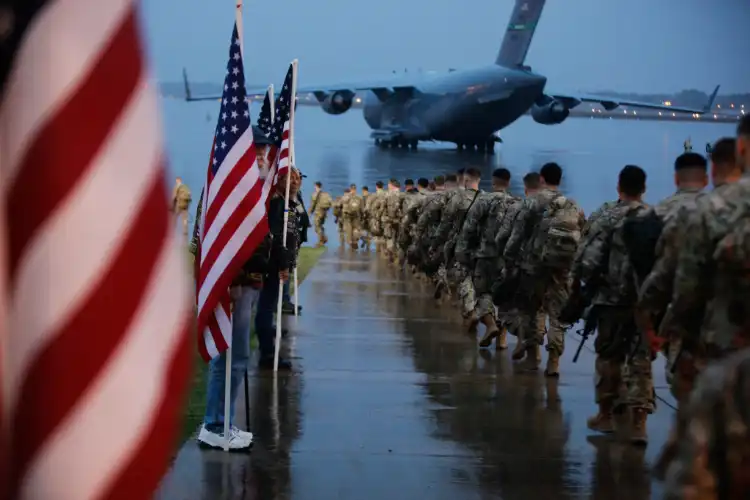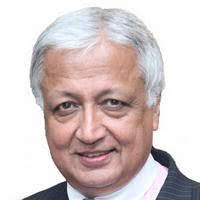
 Deepak Vohra
Deepak Vohra
The rockets that hit Baghdad’s Green Zone have created much excitement. A once progressive nation has been decimated. America’s nation-building project in Iraq is an abject failure. It is an unending war. We are told that the West, read the USA, wanted to control Iraq’s oil reserves. For that Saddam Hussein had to be cut to size. He was getting too big for his boots and wanted to be the leader of the Arab world.
It was not to the liking of the Saudis, who believe they are the leaders not just of the Arabs but of all Muslims. Iraq was invaded and occupied and still has a sizeable foreign military presence. Who has fired the rockets?
Iran is Pimary suspect
If it is indeed responsible, then its message is clear. It can destabilize this region at will. Three missiles struck within the perimeter of the US Embassy. Another hit a school located in a nearby residential complex, injuring a woman and a girl.
Just a few days ago, thousands of people chanting “Death to America,” rallied in the Iraqi capital to mark the second anniversary of the killing of an Iranian commander and his lieutenant in a drone attack by the United States.
Until peace comes between the United States and Iran, we may expect more volatility in this turbulent region. Just a few days ago, the American troops in Iraq and Syria were targeted as rockets struck an Iraqi military base hosting US troops in western Anbar province. Washington blamed Iran-backed Shia armed groups; Iran says American terrorism must end.
What next?
Iran will not give up its nuclear programme – it is an existential guarantee for the regime. It knows what happened to Muammar Gaddafi of Libya; it also knows what has not happened to a fellow called Kim Jong-un of North Korea.
The US was supposed to withdraw all its forces from Iraq by the end of 2021, and yet several thousand remain in an ‘advisory’ role in the country. The Iran-Iraq war of the 1980s messed up global oil supplies. So did the first Gulf War of 1991, officially waged by coalition forces from 35 nations led by the United States against Iraq in response to Iraq's invasion and annexation of Kuwait in August 1990.
The Second Iraq War from 2003 to 2011 began with the invasion of Iraq by the United States-led coalition which overthrew the Saddam Hussein regime. Countries importing oil from the Middle East again suffered.
The invasion was supposed to be part of the George W. Bush administration's War on Terror following the 11 September attacks despite no connection to Iraq. The conflict continued for much of the next decade as an insurgency emerged to oppose the coalition forces and the post-invasion Iraqi government.
From 2006-2009, Iraq was devastated by a Shia-Sunni civil war, stemming from an American-sponsored Sunni Awakening
In 2007 George Bush ordered an increase in the number of American troops to provide security to Baghdad – the so-called surge. Up to one million Iraqis were killed, many of them children.
The Impact
The war-ravaged and disorganized Iraq became the breeding ground for all terrorist groups, including the Islamic State whose insurgency escalated into a full-scale war during 2013-2017. We have self-proclaimed religious leaders crawling out of the woodworking turbulent nations. There emerged a lunatic called Abu Bakr al-Baghdadi, a self-proclaimed Caliph of the new Islamic State, and he urged Muslims to unite to capture Rome to "own the world.”
When trapped by US forces in late 2019 in his hideout, the brave Caliph (an alleged serial rapist and pedophile) used his children as human shields and then blew himself up.
President Donald Trump thanked Russia, Turkey, Syria, Iraq, and the Syrian Kurdish forces for cobbling international cooperation to neutralize a madman.
At its height, the IS controlled 56,000 square kilometers of Iraqi territory with 4.5 million citizens and began to destroy Iraq’s magnificent heritage including mosques, architectural relics, and tombs, just as the Taliban did in Bamiyan in 2001. The violence reached horrendous levels in Iraq with weekly suicide bombings. The IS executed 1,700 Shia Iraqi Air Force cadets in June 2014 and many foreigners.
The genocide of Yazidis by the IS led to the expulsion, flight, and effective exile of the Yazidi people from their ancestral lands in northern Iraq. When the Western-supported Iraqi army retook the remaining IS strongholds in December 2017, a victory parade was held in Baghdad's heavily fortified Green Zone and the Prime Minister declared that 10 December would become a new annual holiday for Iraq.
Al-Baghdadi is similar to Mohammad Ahmed Al Mahdi, late 19th-century dervish of Sudan, who led a successful war against Ottoman-Egyptian military rule in Sudan, and to Sayyīd Muhammad `Abd Allāh al-Hasan, a Somali religious and nationalist leader, dubbed the Mad Mullah, at a time when several foreign powers had divided Somalia, and to Mohammed Omar Mujahid, the one-eyed Afghan political and religious leader, co-founder of the Taliban and founder of the Islamic Emirate of Afghanistan in 1996 who called himself Amir al-Mu'minin, leader of the faithful, but ran away from US troops.
The Iraqi Kurdish issue was another thorn in everybody’s side. In an unofficial referendum in 2017 Iraqi Kurds were supposed to have voted overwhelmingly for independence.In response, the Iraqi Army, supported by the Turks, launched an offensive and the Kurdish state-building project collapsed.
As Afghanistan’s takeover by the Taliban has seen the resurgence of Islamic terrorist groups like Al Qaeda and IS, in Iraq, there are a million insurgencies.
US troops were officially withdrawn in 2011 but the United States became re-involved in 2014. A few days ago, a United States-led coalition fighting ISIL (ISIS) in Iraq claimed to have foiled a drone attack on a base hosting US troops; it was the second attack in 24 hours.
Also Read: OIC Jamboree saw Afghanistan and spoke of Palms
The trouble continues, with every country poking its nose in Iraq, especially Iran, Turkey, and Saudi Arabia.
French writer Jean-Baptiste Alphonse Karr said in the mid-19th century: plus ça change, plus c'est la même chose (the more it changes, the more it is the same).
(Deepak Vohra is a senior diplomat, special Advisor to Prime Minister on Lesotho, South Sudan and Guinea-Bissau and Special Advisor to Ladakh Autonomous Hill Development Councils, Leh and Kargil)
